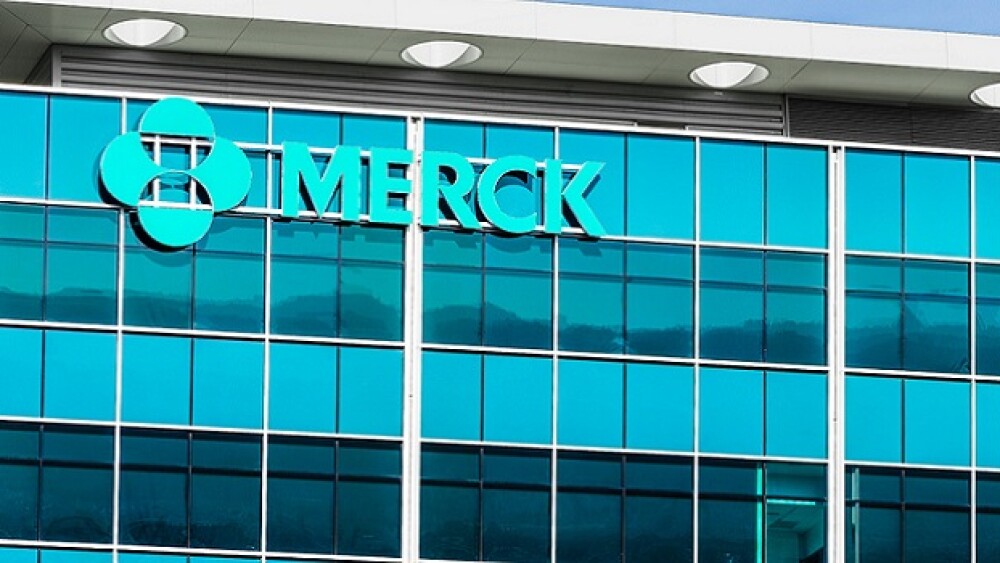Seeking to deepen its immuno-oncology business, Merck has closed a deal potentially worth $22 billion across three of Daiichi Sankyo’s DXd antibody-drug conjugates for various solid tumor indications.
Pictured: Merck building in California/iStock, Sundry Photography
Merck and Daiichi Sankyo on Thursday signed a global development and commercialization agreement to advance three of the Japanese pharma’s DXd-based antibody-drug conjugates for various solid tumor indications.
Under the terms of the deal, Merck will make an upfront payment of $4 billion in addition to $1.5 billion in continuation tranches over the next 24 months. Daiichi Sankyo will also remain eligible for up to $16.5 billion—$5.5 billion for each antibody-drug conjugate (ADC) candidate—contingent on specific sales milestones.
In addition, Merck will pay $500 million each upfront for two of the investigational ADCs, a pro-rated portion of which is refundable if development for either molecule is terminated early.
Taken together, the agreement has a total value of $22 billion across the three ADC programs.
The deal will help Merck “augment and diversify our oncology pipeline while building on our immuno-oncology foundation,” CEO Robert Davis said in a statement, adding that the three Daiichi Sankyo programs underscore the “far-reaching potential of ADCs” in providing new cancer treatment options for patients.
The two companies will co-develop and co-commercialize the three Daiichi Sankyo ADCs. In exchange for its multibillion-dollar investment, Merck will receive worldwide rights to the potentially first-in-class DXd ADCs: patritumab deruxtecan, ifinatamab deruxtecan and raludotatug deruxtecan. Daiichi Sankyo will retain exclusive rights to these molecules in Japan.
Designed and developed using Daiichi Sankyo’s proprietary DXd platform, all three investigational ADCs combine a highly specific antibody targeted against a particular tumor antigen and an exatecan derivative, which is a strongly cytotoxic topoisomerase I inhibitor. These two components are fused together using a cleavable tetrapeptide linker.
Patritumab deruxtecan seeks out the HER3 antigen, which is overexpressed in several malignancies, such as breast, ovarian, lung and colorectal cancer. Daiichi Sankyo is planning to submit a Biologics License Application for patritumab deruxtecan by the end of March 2024 using data from the Phase II HERTHENA-Lung01 study.
Results from this trial, presented last month at the 2023 World Conference on Lung Cancer, demonstrated a clinically meaningful response rate in patients with advanced or metastatic non-small cell lung cancer who had progressed after treatment with an EGFR TKI and platinum chemotherapy.
Ifinatamab deruxtecan targets the B7-H3 antigen and is being assessed for previously treated extensive-stage small cell lung cancer in the Phase II Ideate-01 study. Raludotatug deruxtecan is the earliest stage of the three programs covered by the Merck-Daiichi partnership and is directed against the CDH6 protein. It is currently in a first-in-human Phase I trial in advanced ovarian cancer.
The three programs represent a potential multibillion-dollar worldwide revenue opportunity, according to Daiichi Sankyo. Big pharma companies are investing heavily in ADCs, which are composed of a monoclonal antibody targeted to antigens on tumor cells, a potent cytotoxic payload such as a chemotherapeutic drug, as well as a linker between the two.
Tristan Manalac is an independent science writer based in Metro Manila, Philippines. He can be reached at tristan@tristanmanalac.com or tristan.manalac@biospace.com.






